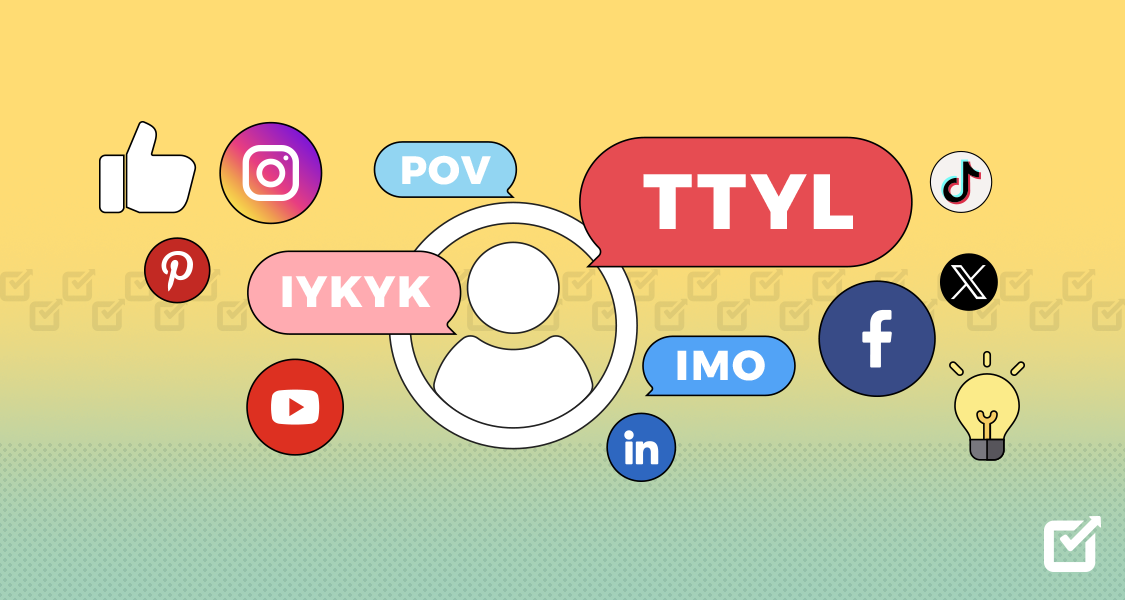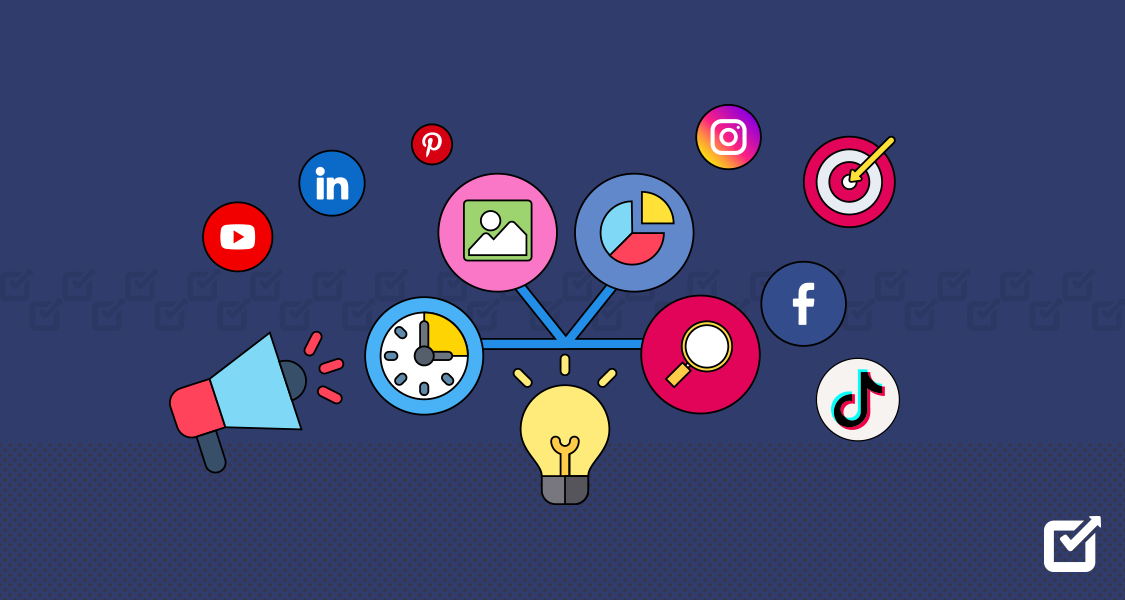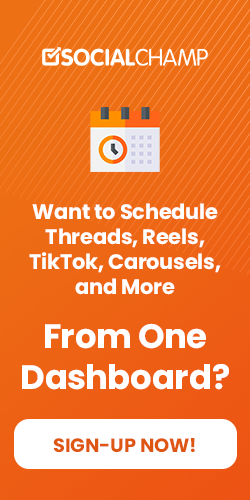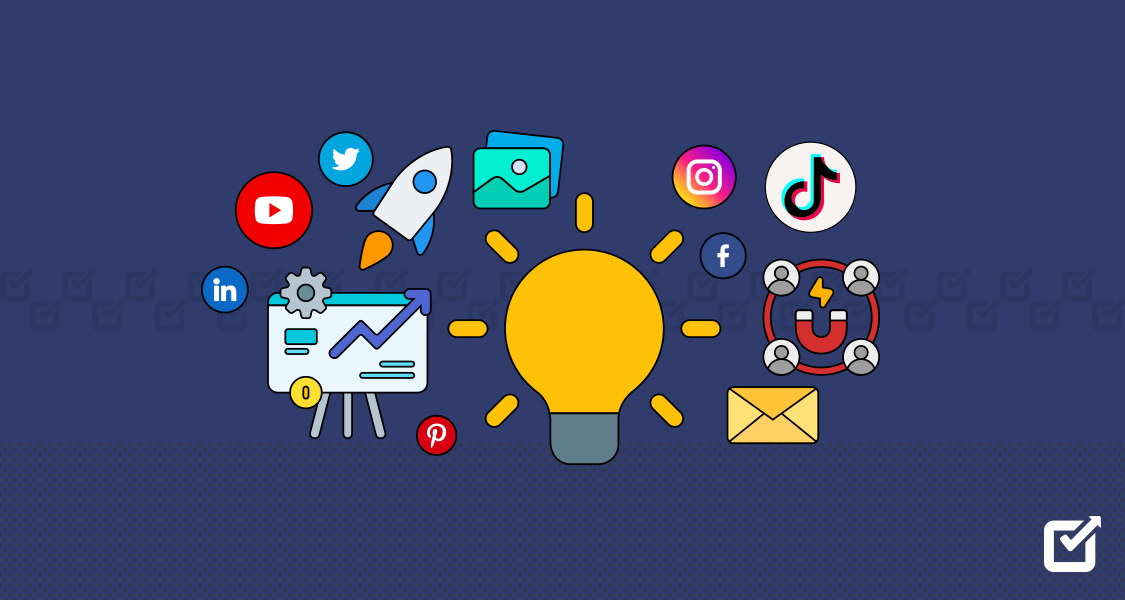Ever been mid-conversation and hit with a confusing jumble of letters? That happened to me recently when someone casually dropped “PTAT” without explanation. My brain scrambled to decode the four-letter mystery (spoiler alert: it’s “People Talk About That”).
Social media is a labyrinth of acronyms. Platforms like TikTok and Instagram are practically different languages for millennials. You might even feel like you need a dedicated Duolingo course to decipher it all.
Fear not, fellow millennial! While I, a Gen Z myself, still encounter the occasional head-scratcher, I’ve compiled a helpful list of common social media slang to get you back in the know.
Before we move ahead, I just wanted to shed light on the social media scheduler. Use the best scheduler to maximize your engagement rate if you want to post consistently on the platform with cool social media abbreviations.
Social Media Acronym – Definition & Full Forms
Social media is full of shorthand! Acronyms like LOL (Laugh Out Loud) and FOMO (Fear Of Missing Out) help us express feelings quickly. Learning these can make social media more fun and understandable.
Here’s a breakdown of all acronyms on social media based on different categories.
Network-Specific Acronyms & Abbreviations
Navigating through various social media platforms often feels like deciphering a code, with each network having its own set of acronyms and abbreviations. These shorthand expressions streamline communication within specific platforms, from ‘DM’ (Direct Message) on Instagram to ‘RT’ (Retweet) on Twitter.
Let’s start with the network-specific acronyms:
- FB – Facebook
- LI – LinkedIn
- IG – Instagram
- TW – Twitter
- SC – Snapchat
- YT – YouTube
Now, let’s decode the social media abbreviations used on these platforms.
DM – Direct Message
A private message sent directly between two users on a social media platform. DMs allow for one-on-one communication that is not visible to the public.
PM – Private Message
Similar to DM, PM is a private message sent privately between users on a social media platform. It allows for confidential communication that is not public.
RT – Retweet
On Twitter, RT stands for Retweet. It refers to sharing someone else’s tweet with your followers. It’s a way to amplify exciting or relevant content to a broader audience.
MT – Modified Tweet
MT stands for Modified Tweet. It’s similar to a retweet but indicates that the user has modified or paraphrased the original tweet before sharing it with their followers. This is often done to add commentary or context to the original tweet.
NB – Not Bad
NB is an acronym for expressing mild approval or satisfaction with something. It’s often used in informal conversations on social media to indicate that something is good or satisfactory, though not necessarily outstanding.
GA – Google Analytics
GA stands for Google Analytics, a web analytics service offered by Google that tracks and reports website traffic. It provides valuable insights into a website’s performance, including the number of visitors, their demographics, behavior, and more.
Social Media Acronyms for Business
Social media acronyms are invaluable for businesses, simplifying communication and strategy. For instance, ROI (Return on Investment) helps gauge marketing effectiveness, while KPIs (Key Performance Indicators) measure success.
Understanding these acronyms empowers businesses to navigate social media terrain confidently and efficiently.
Let’s decode each acronym for business.
ROI – Return on Investment

ROI ROI is a measure used to evaluate an investment’s profitability relative to its cost. It indicates the efficiency of an investment in generating profit.
KPI – Key Performance Indicator
KPIs are specific metrics used to evaluate the success of an organization or a particular activity. They are essential in measuring progress towards business goals.
CPC – Cost Per Click
CPC is the amount of money an advertiser pays for each click on their online advertisement. It’s a common pricing model in online advertising campaigns.
CTR – Click-Through Rate
CTR refers to the ratio of users who click on a specific link to the number of total users who view a page, email, or advertisement. It’s often used to measure the effectiveness of online campaigns.
CPA – Cost Per Acquisition
The cost an advertiser gets for acquiring a new customer or lead. It is calculated by dividing the total cost of acquiring customers by the number of acquired customers.
CPL – Cost Per Lead
The cost an advertiser pays for each potential customer or lead generated through marketing efforts. It is calculated by dividing the total cost of lead generation by the number of leads acquired.
CRM – Customer Relationship Management
A strategy and technology used by businesses to manage interactions with current and potential customers. CRM systems help in improving customer relationships and driving sales growth.

social media acronyms SEO – Search Engine Optimization
The process of optimizing a website to improve its visibility and ranking in search engine results. SEO aims to increase organic (non-paid) traffic to a website.
SEM – Search Engine Marketing
A form of online marketing that promotes websites by increasing their visibility in search engine results pages (SERPs) through paid advertising.
SMM – Social Media Marketing
The use of social media platforms to connect with audiences, build brand awareness, drive website traffic, and increase sales.
CMS – Content Management System
A software application or platform that allows users to create, edit, manage, and publish digital content on the web. CMSs are commonly used for websites, blogs, and online stores.
CTA – Call to Action
A prompt or instruction that encourages the audience to take a specific action, such as signing up for a newsletter, downloading a resource, or making a purchase.
B2B – Business to Business
Refers to transactions or relationships between two businesses, such as a manufacturer selling products to a retailer.
B2C – Business to Consumer
Refers to transactions or relationships between a business and individual consumers, such as a retail store selling products to customers.
UX – User Experience
The overall experience of a person using a product or service, including usability, accessibility, and satisfaction.
UI – User Interface
The visual elements and interactive components of a digital product or system that users interact with. UI design focuses on enhancing the usability and visual appeal of interfaces.
FAQ – Frequently Asked Questions
A list of common questions and their answers provided to address recurring inquiries from customers or users.
CPM – Cost Per Thousand Impressions
A pricing model used in online advertising, where advertisers pay a fixed rate for every one thousand impressions (views) of their advertisement.
CR – Conversion Rate
The percentage of website visitors who complete a desired action, such as making a purchase, filling out a form, or subscribing to a newsletter.
FOMO – Fear of Missing Out
The anxiety that one might miss out on an opportunity, event, or experience that others are enjoying. FOMO is often used in marketing to create urgency or drive engagement.
EOD – End of Day
Refers to the close of business hours or the conclusion of a workday.
ETA – Estimated Time of Arrival
The anticipated time at which something is expected to arrive or be completed.
HT – Heard Through
Used to acknowledge the source of information or content shared on social media, similar to ‘via’ or ‘credit to.’
ICYMI – In Case You Missed It
Used to draw attention to content or information that was previously shared and may have been overlooked by some users.
POV – Point of View
Refers to a particular perspective or opinion on a topic or issue.
TOFU – Top of Funnel
TOFU refers to the initial stage of the sales funnel where potential customers are introduced to a brand or product.
MOFU – Middle of Funnel
Represents the middle stage of the sales funnel, where leads have shown interest in a brand or product but are not yet ready to make a purchase.
BOFU – Bottom of Funnel
Denotes the final stage of the sales funnel, where leads are ready to make a purchase decision.
TOS – Terms of Service
The legal agreement between a user and a service provider that outlines the rules, obligations, and responsibilities associated with using the service.
Popular Social Media Acronyms
Social media is a vibrant space filled with its own language of acronyms. These shorthand expressions make communication faster and more dynamic. From the light-hearted ‘LOL’ for laughter to ‘DM’ for sending private messages, mastering these acronyms adds flair to online conversations. Let’s crack the code to popular Gen Z social media acronyms.
LOL – Laugh Out Loud
Used to indicate amusement or laughter in response to something funny.
Example: ‘That meme is so funny, LOL!

social media acronyms BRB – Be Right Back
Indicates that the person will be away momentarily and will return shortly.
Example: ‘I need to grab a snack, BRB!’
TBT – Throwback Thursday
Refers to sharing old photos or memories on Thursdays.
Example: ‘Here’s a TBT photo from my vacation last summer.’

TBT TBH – To Be Honest
Used to preface an honest opinion or statement.
Example: ‘TBH, I didn’t really enjoy that movie.’
IMHO – In My Humble Opinion
Used to express one’s opinion in a modest or humble manner.
Example: ‘IMHO, pineapple doesn’t belong on pizza.’
SMH – Shaking My Head
Indicates disappointment, disbelief, or disapproval.
Example: ‘SMH, I can’t believe he said that.’
SMH – So Much Hate
SMH also refers to the expression of negative or hateful sentiment on social media.
Example: ‘I can’t believe there’s SMH on social media lately.’
FWIW – For What It’s Worth
Used to introduce a comment or opinion, often to provide additional context.
Example: ‘FWIW, I think you should go for it.’
BTW – By The Way
Used to introduce additional or incidental information in a conversation.
Example: ‘BTW, did you hear about the new restaurant downtown?’
AMA – Ask Me Anything
Refers to a question-and-answer session where participants can ask anything.
Example: ‘I am hosting an AMA session on Reddit tomorrow.’
TMI – Too Much Information
Indicates that someone has shared more details than necessary or desired.
Example: ‘TMI, I don’t need to hear about your personal problems.’
YOLO – You Only Live Once
Encourages taking risks or seizing opportunities because life is short.
Example: ‘Let’s go skydiving, YOLO!’
NBD – No Big Deal
Indicates that something is not important or significant.
Example: ‘Thanks for helping out, NBD.’
DIY – Do It Yourself
Refers to activities or projects that are done independently or without professional help.
Example: ‘I found a great DIY tutorial for home decor.’
BFF – Best Friends Forever
Refers to a close friendship that is expected to last indefinitely.
Example: ‘She’s been my BFF since kindergarten.’
OMG – Oh My God
Used to express surprise, excitement, or disbelief.
Example: ‘OMG, did you hear the news?’
JK – Just Kidding
Indicates that a previous statement was made in jest or as a joke.
Example: ‘I am not really mad, JK!’
TGIF – Thank God It’s Friday
Expresses relief or excitement that the workweek is ending and the weekend is beginning.
Example: ‘TGIF, I can’t wait for the weekend.’
IDK – I Don’t Know
Indicates uncertainty or lack of knowledge about something.
Example: ‘IDK what to wear to the party.’
FYI – For Your Information
Used to provide information or notify someone about something.
Example: ‘FYI, the meeting has been rescheduled to tomorrow.’
BAE – Before Anyone Else
Refers to a romantic partner or significant other who is considered a top priority.
Example: ‘She’s my BAE, I love her so much.’

Bae GTG – Got To Go
Indicates that the person needs to leave or end the conversation.
Example: ‘GTG, talk to you later!’
ROFL – Rolling On the Floor Laughing
Used to indicate extreme amusement or hilarity.
Example: ‘That joke had me ROFL!’
NVM – Never Mind
Indicates that something previously mentioned or asked about is no longer relevant.
Example: ‘NVM, I found the keys.’
TL;DR – Too Long; Didn’t Read
Indicates a summary of text or content for those who don’t want to read the entire thing.
Example: ‘Can you give me a TL;DR of the article?’

tl;dr IRL – In Real Life
Indicates that something exists or happens outside of the digital or online world.
Example: ‘I met my online friend IRL last weekend.’
FBF – Flashback Friday
Refers to sharing old photos or memories on Fridays.
Example: ‘Here’s a cute FBF photo from my childhood’
TTYL – Talk To You Later
Indicates that the person will talk to the recipient again at a later time.
Example: ‘I need to go now, TTYL!’
Related Article: How to Craft a Successful Influencer Marketing Strategy in 2024
OOTD – Outfit Of The Day
Refers to sharing a photo of one’s outfit for the day.
Example: ‘Here’s my OOTD for today, what do you think?’

OOTD TFW – That Feeling When
Used to describe a relatable feeling or emotion in a humorous or empathetic way.
Example: ‘TFW you finally finish a project you have been working on for weeks.’
BTAIM – Be That As It May
It is used to acknowledge a point made by someone else in a conversation but indicates that the speaker is going to continue with their own argument or perspective.
Example: ‘I understand your concerns about the project timeline, BTAIM, we still need to prioritize quality over speed’

social media acronyms CMV – Change My View
It’s commonly used in online forums or discussions, particularly on platforms like Reddit, to invite others to challenge or provide alternative perspectives to the speaker’s opinion or viewpoint.
Example: ‘I believe renewable energy is the future, but CMV if you think otherwise’
DAE – Does Anyone Else….?
Used in online forums or social media to gauge if others share a particular experience, opinion, or sentiment with the speaker.
Example: ‘DAE find it annoying when people chew loudly?’
DFTBA – Don’t Forget to Be Awesome
A positive and encouraging phrase commonly used among friends or within communities to remind each other to stay positive and confident.
Example: ‘Just a reminder to all my friends: DFTBA, even on the toughest days!’
FUTAB – Feet Up, Take a Break
A casual and friendly reminder or suggestion for someone to relax and take a break from whatever they are doing.
Example: ‘FUTAB, you have earned it!’
ELI5 – Explain like I am 5 (years old)
A request for a simplified explanation of a complex topic as if explaining it to a young child. Commonly used on Reddit.
Example: ‘Can someone ELI5 how black holes work?’
F2F – Face to Face
Refers to interactions or meetings that occur in person.
Example: ‘I prefer F2F conversations over texting.’
GRWM – Get Ready With Me
A popular acronym often used in social media captions or videos, particularly on platforms like YouTube and Instagram.
Example: ‘GRWM: Date Night Edition’
@jmdimov Delulu – Delusional
Used in online slang to describe someone who is excessively or unrealistically optimistic or idealistic, especially in the context of romantic relationships or fandoms.
HIFW – How I Feel When
An acronym is used to introduce a relatable or humorous expression of emotions or experiences.
Example: ‘HIFW, I finish a great book and can’t handle the ending’
Be the Master of Social Media Lingo!
Post consistently on multiple platforms with Social Champ, and don’t forget to use these cool acronyms in your posts.
HTH – Here To Help
This interpretation implies that the speaker is available and ready to assist with any questions or issues.
Example: ‘Someone might respond to a query with “HTH” to indicate that they are available to provide assistance’
IANAD – I Am Not a Doctor
Often used to preface a statement or opinion by indicating that someone is not a medical professional and, therefore their input should not be taken as professional medical advice.
Example: ‘IANAD, but I think drinking plenty of water can help with headaches.’
IFYP – I Feel Your Pain
An empathetic expression used to convey understanding and sympathy towards someone who is going through a difficult or challenging situation.
FaTH – First and Truest Husband
Typically used affectionately or humorously to refer to a person’s initial and most significant spouse, often with nostalgic undertones.
Example: Just had coffee with my FaTH, reminiscing about old times.
XOXO
A popular term used to convey affection or love, especially in written communication.
Example: ‘See you soon! XOXO’

XoXo ORLY – Oh really?!
Often used in online communication, particularly in casual conversations or social media interactions.
Example: ‘ORLY? That’s interesting!’
TIL – Today, I Learned
To share interesting or surprising pieces of information that the user has recently discovered.
Example: ‘TIL that the inventor of the Frisbee was turned into a Frisbee after he died!’
POTD – Photo of the Day
Often used on social media platforms, photography websites, or blogs to highlight a single photograph chosen as the best image.
Example: ‘POTD: Sunset at the beach’
QQ
An emoticon commonly used in online gaming and messaging platforms to represent crying or tears.
Example: ‘QQ, I am disappointed’
BUMP
A social media acronym used on social media platforms to bring attention back to a particular post or thread by “bumping” it to the top of the feed.
Example: ‘Please BUMP this post’
SSDD – Same Stuff, Different Day
A casual and often humorous expression used to convey a sense of routine or monotony in one’s daily life.
Example: ‘Another day at the office, SSDD’
SUS – Suspicious
To describe something or someone that seems questionable, untrustworthy, or sketchy.
Example: ‘He seems sus to me’
TIME – Tears In My Eyes
An emotive expression used in online communication to convey a strong emotional response.
Example: ‘Wow, that sounds incredibly touching. TIME’
YSK – You Should Know
To preface information or advice that the user believes is important or useful for others to be aware of.
Example: ‘YSK -The deadline for registration is tomorrow’
GOAT – Greatest Of All Time
GOAT stands for “Greatest Of All Time,” used to hail someone as the undisputed best in their field.
Example: Many sports fans consider Michael Jordan the GOAT of basketball due to his numerous championships, scoring records, and overall impact on the game.

Goat TNTL – Trying Not To Laugh
Used when someone is attempting to resist the urge to laugh.
Example: ‘Watching that comedy show, TNTL because I am in a library.’
UV – Unique Visitor
Refers to an individual user who visits a website or webpage within a specified time frame.
Example: ‘Our website had 500 UVs yesterday, indicating strong traffic.’
MTFBWY – May The Force Be With You
A popular phrase from the Star Wars franchise, used to wish someone luck or success.
Example: ‘Good luck on your presentation today, MTFBWY!’
LMS – Like My Status
A request for others to like a social media post.
Example: ‘Just got a new job, LMS to show your support!’
MCM – Man Crush Monday
A social media trend where users post about their admiration for a male individual on Mondays.
Example: ‘Posting a photo of my boyfriend for #MCM because he’s the best!’
CC – Carbon Copy
On social media platforms like Twitter, CC, or ‘Carbon Copy,’ serves a similar function to its email counterpart.
When a user wants to ensure that another Twitter user sees their tweet, they can include their Twitter handle preceded by the “@” symbol in the tweet’s message.
WBU – What About You?
A question asking for the other person’s opinion or response.
Example: ‘I just finished watching a movie. WBU?’
WCW – Woman Crush Wednesday
A social media trend where users post about their admiration for a female individual on Wednesdays.
Example: ‘Sharing a photo of my best friend for #WCW because she’s amazing!’
WDYMBT – What Do You Mean By That?
A request for clarification or explanation about something that was said or written.
Example: ‘You lost me with that last comment. WDYMBT?’
Featured Article: 250 Best Facebook Captions in 2024
WFH – Working From Home
Indicates that someone is conducting work-related tasks from their home rather than from a
traditional office.
Example: ‘Due to the pandemic, many employees are WFH to ensure safety.’
IDC – I Don’t Care
Indicates a lack of interest or concern about a particular topic or situation.
Example: ‘You can choose the movie tonight. IDC.’
IDK – I Don’t Know
Indicates uncertainty or a lack of knowledge about something.
Example: ‘IDK where we should eat for dinner. Any suggestions?’
- IKR – I Know, Right?
Used to express agreement or validation with something that was said.Example: ‘This weather is so unpredictable. IKR?’ ILY – I Love You
Expresses deep affection or romantic feelings towards someone.
Example: ‘ILY more than words can express.’
ASMR – Autonomous Sensory Meridian Response
Refers to a tingling sensation that some individuals experience in response to specific auditory or visual stimuli. ASMR content often includes whispered voices, gentle sounds, or repetitive actions, intended to induce relaxation.
- NM – Not Much
Indicates that there is nothing significant or noteworthy happening.Example: ‘Just chilling at home, NM. How about you?’ NSFW – Not Safe For Work
Indicates that the content being shared is inappropriate or unsuitable for viewing in a professional or formal setting.
Example: ‘Be careful opening that link; it’s NSFW.’
NVM – Never Mind
Indicates that something previously mentioned is no longer relevant or important.
Example: ‘Sorry, NVM. I found the information I needed.’
OH – Used as Context for Quotes
Indicates that the following statement is a direct quote from someone else.
Example: ‘She said, ‘OH, I forgot to bring my umbrella.’
OMW – On My Way
Definition: Indicates that the speaker is currently in transit to a particular location.
Example: ‘Running a bit late, but OMW to the meeting’
Technical Acronyms on Social
From ‘SEO’ (Search Engine Optimization) to ‘API’ (Application Programming Interface), these acronyms serve as shortcuts to intricate processes and technologies. Let’s decipher some of the technical social media acronyms.
API – Application Programming Interface
A set of rules and protocols that allows different software applications to communicate with each other.
Example: ‘Our app uses the Twitter API to fetch real-time tweets.’
UGC – User-Generated Content
Content created and shared by users on social media platforms, websites, or forums.
Example: ‘Our campaign went viral thanks to the UGC shared by our customers.’

social media acronyms CTA – Call to Action
A prompt or instruction designed to encourage a specific action from the audience, such as clicking a link, making a purchase, or signing up for a newsletter.
Example: ‘Don’t forget to include a CTA at the end of your post to drive engagement.’
FBF – Flashback Friday
A social media trend where users share old photos or memories on Fridays.
Example: ‘FBF to our team outing last summer.’
BRB – Be Right Back
Indicates that the person will be away from their computer or device for a short period and will return soon.
Example: ‘I need to grab a coffee, BRB.’
CMS – Content Management System
A software application or platform used to create, manage, and publish digital content.
Example: ‘We use WordPress as our CMS to manage our website content.’
CRM – Customer Relationship Management
A strategy and technology used to manage interactions and relationships with current and potential customers.
Example: ‘Our CRM system helps us track customer interactions and improve engagement.’
RSS – Really Simple Syndication
A web feed format used to publish frequently updated content, such as blog posts or news headlines.
Example: ‘Subscribe to our RSS feed to receive updates on our latest blog posts.’
ASO – App Store Optimization
The process of optimizing mobile apps to improve their visibility and ranking in app store search results.
Example: ‘Our ASO efforts resulted in a significant increase in app downloads.’
HTML – Hypertext Markup Language
The standard markup language used to create and design web pages and web applications.
Example: ‘I am learning HTML to build my own website from scratch.’
CMGR – Community Manager
A professional responsible for managing and engaging with an online community or social media audience on behalf of a brand, organization, or group.
Example: ‘Our CMGR monitors social media channels & responds to comments’
Conclusion!
Acronyms serve as the shorthand language that keeps conversations concise and engaging. From expressing emotions with ‘LOL’ to discussing business strategies with ‘ROI,’ these acronyms simplify communication and bridge gaps between users worldwide.
Whether you are a casual user or a marketing professional, understanding social media acronyms is essential for effective online interaction. So, the next time you are scrolling through your feed or crafting a post, don’t forget to sprinkle in a few acronyms to express yourself or convey your message.
After all, in the world of social media, mastering these little abbreviations can make a big difference!
Frequently Asked Questions
1. What are the acronyms in social media?
2. Why do people use acronyms on social media?
3. What are the most used acronyms and abbreviations on social media?
LOL (Laugh Out Loud)
OMG (Oh My God)
TBH (To Be Honest)
FYI (For Your Information)
BRB (Be Right Back)
IMO (In My Opinion)






















1 thought on “120+ Social Media Acronyms & Slangs for Every Millennials & Gen Zers in 2024”
It’s essential to understand these to fully engage on social platforms today. Thanks for compiling it.